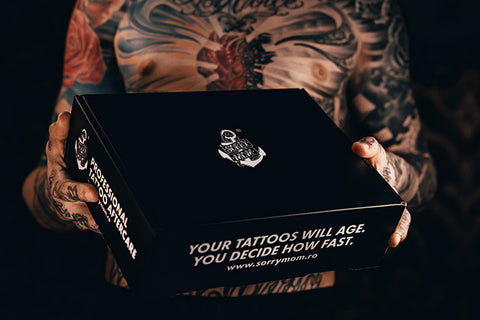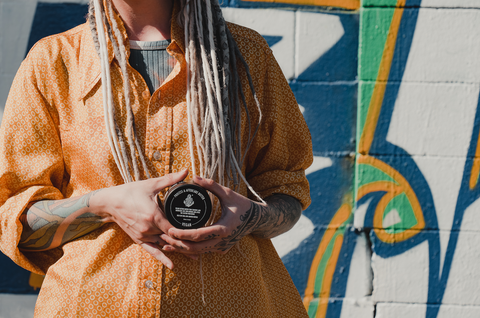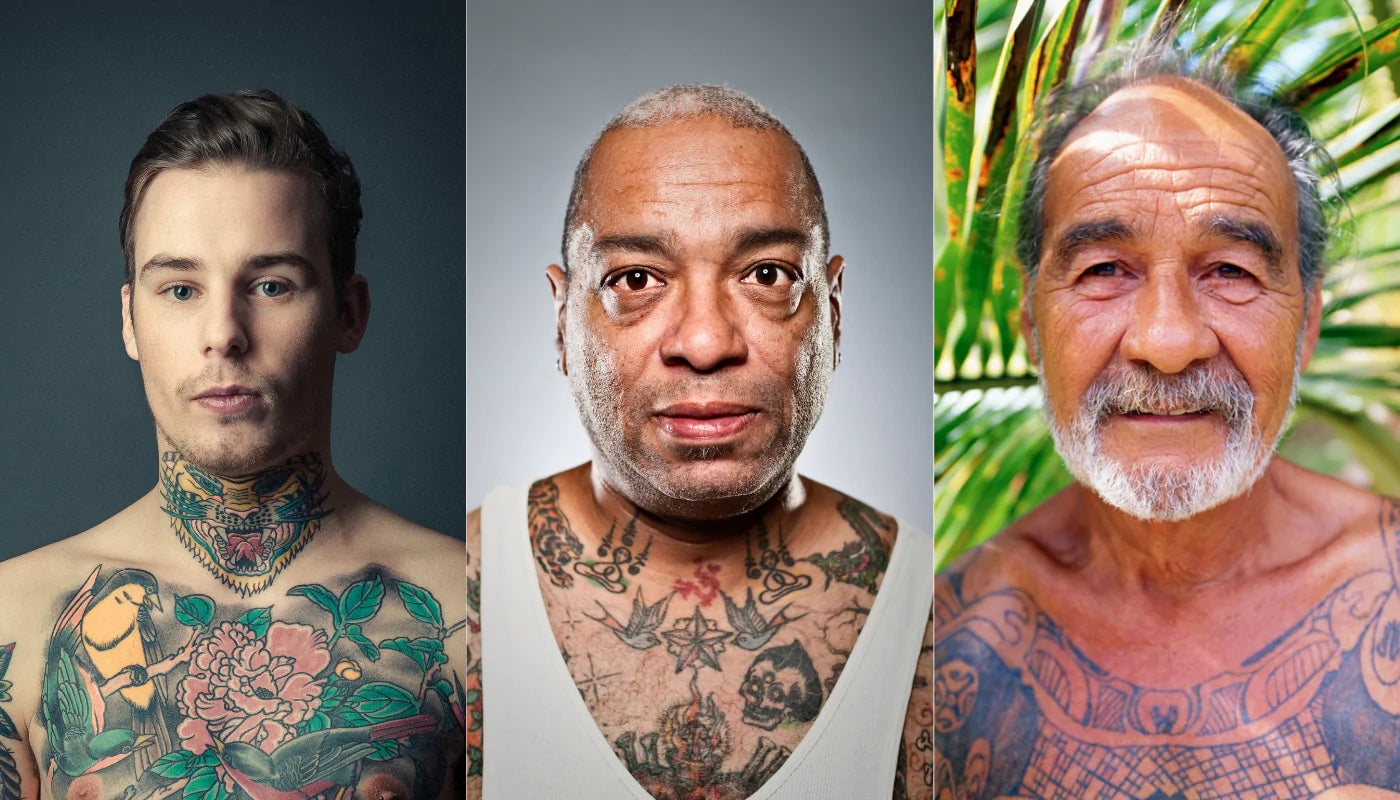Many of us have thought about it, or perhaps even been asked about this at some point: “What will my tattoo look like when I’m older?” The question is a valid one, as we go through a number of bodily changes as we age.
The most immediate concern for many is how the appearance of our tattoos will change as our skin sags and the wrinkles grow more pronounced.
These effects on our tattoos will be inevitable. But one does wonder what the process of aging might appear like. So, the question still stands: will my tattoo age over time?
Definitely, your tattoos will age.
But don’t let this deter you from getting your next ink done, whether it is your first time or your hundredth time doing so.

Is it possible for that tattoo to keep looking good twenty, thirty, fourty, even fifty years down the line? Certain types of tattoos age much better than others.
Read Also: How to Take Care of a Tattoo (Step by Step)
Good tattoo care, quality ink, and an experienced tattoo artist will make any tattoo thrive longer.
Let's take a look at the factors defining tattoo aging, and the ways to prevent it.
How Do Tattoos Age Over Time?
Tattoos will inevitably fade over time.
Immediately after getting your ink done, your tattoo will begin to fade as it heals and will not look as vibrant as when your artist first deposited the ink into your skin.
Following the aftercare period, depending on the type of tattoo you have gotten, the tattoo can begin to fade almost immediately.

If you’ve had your tattoo for decades, it may not even resemble the original art you first got because of these factors breaking down the pigment and causing it to appear muddled.
Your environment and lifestyle play a huge role in determining the longevity of your tattoos.
Let's take a look at the factors that affect tattoo aging:
8 Factors of Tattoo Aging
#1 Sunlight
The biggest enemy to tattoos is the sun – which is why SPF and sun protection is critical to preserve your tattoo and its vibrancy for a longer time.
The sun’s UV rays have an immense effect on your tattoos, whether you are young or old. The sun is usually the cause for the fading of our tattoos.
As you age, the elastin in your skin breaks down because of the sun and its UV rays. This means that overtime, your skin is unable to snap back to its original state, thus sagging and wrinkling.

#2 Poor aftercare routine
The single most important way to make any tattoo age well is good tattoo aftercare. It’s one of the best -and easiest- ways to make a tattoo keep looking good over time.
Not following a good aftercare routine will make the difference between a healthy, good-looking tattoo and a dull, blurry one.
Follow the instructions given by your tattoo artist, or look for a list of aftercare steps.
Read Also: Benefits of Using Tattoo Care (According to Science)
#3 Bad quality ink
Another factor in tattoos aging poorly is from the ink that your artist uses itself.
Of course, higher-quality ink is better.

Cheaper inks tend to age badly and quickly. They also pose as a health risk as they could be unregulated.
Always be sure to trust your tattoos with reputable artists/shops with experience.
#4 Tattoo placement
Another factor of tattoo aging is dependent on the location of your tattoo.
This has a big effect on tattoos because the artwork can be compromised as your skin wrinkles and sags. Outlines may get muddled, colours will fade, and the original ink might not be discernable.
Areas of the body that have more friction and wear applied to them will lose their skin cells more easily and so your tattoo will fade more easily.
These areas of the body often have stretchier skin that will distort your tattoo in the short and long run.
Other parts of your body are more likely to gain or lose weight. Places like your stomach and legs may gain weight as you get older or shrink as you get back in shape. This may distort your ink too.
The best places to put your tattoo are areas that don’t see as much light, friction, or stretching. These areas are your chest, your back, your shoulders, and your upper arm.
While you might have planned to put that tattoo in the perfect spot, think again; to have it last a lifetime you need to consider location.
#5 Ink color
The color of your ink will make your tattoo age a whole lot better.
Darker colors, especially black, fade much less than brighter colors, especially red.
Black and grayscale colors last usually longer than colored tattoos.

This is especially the case with white hued tattoos.
Watercolour technique tattoos and coloured tattoos can also begin to fade almost immediately, though not as drastic as white hued tattoos.
#6 Detail
The more detailed the tattoo, the worse it’ll age. That’s a simple, unavoidable fact. Thin lines, shading, small words, and small tattoos all fade much more quickly.
Some like the effects age has on their tattoo. However, that tattoo will likely blur together if it’s got too much detail.
Bolder lines, thicker lines, and larger designs will better stand the test of time.
#7 Lifestyle
The other way that gives that ink a better chance of thriving is having a healthy lifestyle.
Make sure to stay healthy.
Drinking water is good for you and your skin. Exercise and make sure to keep a healthy weight.
While bulking up or filling out aren’t going to ruin your tattoo, gaining lots of weight will stretch out the ink, especially on parts of the body that gain weight more easily.

#8 The artist
This one might also seem obvious, but it has more ramifications than you may first think.
Your skin has three layers:
- The epidermis (outer protective layer)
- The dermis (middle substantial and support layer)
- The hypodermis (bottom, fatty layer).
The dermis is only one millimeter thick. It also just so happens to be where the ink for your tattoo is kept.
Miss that layer, and either your ink will fade quickly (in the epidermis) or blowout, becoming a cloud of messy lines (in the hypodermis).

You need an experienced tattoo artist not just for this step.
That tattoo artist can help with location, detail, ink choice, product recommendation for lifetime care, and aftercare instructions. Don’t skimp out.
Look for tattoo artists that will give you the best.
Prevent Tattoo Aging With These Tips
Following basic tips will increase your chances of creating that good-looking tattoo that ages well.
The following practices will increase the longevity of your tattoos:
- Wear sunscreen
SPF is your best friend when it comes to your tattoos in general because it helps with fading, but SPF is also crucial to prolonging the effects on the sun.
It will overall maintain and preserve your skin which in turn will reduce the effects of UV rays on your tattoo.
- Stay hydrated
The goal is to maintain the elastin in your skin to prevent it from affecting your tattoos. Don’t forget to drink plenty of water to stay hydrated and healthy.

- Follow aftercare instructions
Following the instructions your tattoo artist has given you diligently as soon as you have gotten your work done is super important to ensure that your piece stays looking fresh for years to come, as this establishes how well the pigment will adhere in the layers of your skin.
They generally include, but aren’t limited to:
- Keeping it covered for several hours
- Washing gently with soap and water
- Moisturizing at least twice a day (depending on your skin type - our website compiled good information on aftercare moisturizing),
- Avoid the sun.
- Wear thin-spun clothes if possible
- Replenish your collagen
Whether it is through oils or supplements, maintaining the collagen in your skin can help preserve the boldness of your tattoos.
Collagen helps the skin by preventing it from sagging and keeps it plump. Collagen production tends to slow as we age, which is why supplementing it can help preserve your tattoos as well.
Body Parts Where Tattoos Change the Most and the Least with Age
People tend to underestimate the effects of friction or over exfoliation on the body. The best areas for tattoos are where it meets the least amount of disturbance.
Worst Areas
- An area like the leg can be subject to your tattoo undergoing fading, especially if you wear tight pants.
- Stomach.
- Chest.
- Wrist.
- Feet.
Best Areas
The best parts for tattoos in order to prevent it from changing over time would be areas like:
- Inner forearm
- Outer parts of the chest
- Back of the neck
- Center of the lower back.
These areas are generally protected by clothes or are ideal locations where things like weight gain and the sun don’t have a visible effect on, thus preserving the pigments.
Do Tattoos Look Bad When You Get Old?
Yes, your tattoo will age. It’s inevitable. Doing a simple search, you can find plenty of horrifying or depressing pictures of aged tattoos.
However, many of these disasters didn’t follow the proper ways to make your tattoo last.
As you age, skin will sag and wrinkle, sagging and wrinkling your ink with it.
But proper care can ensure the best looking tattoo possible even at an advanced age.
Can Tattoos Age Well?
The short answer? Yes! But - as mentioned before - it depends on many things.
If you are nineteen years old and just got that small, detailed, and colorful design of a beautiful goddess on your upper thigh, you might be in for lots of trouble over time.
On the other hand, if you’re twenty and got a fist-sized three-word black tattoo on your upper arm, that one has a much higher chance of survival.
What is the Best Age to Have a Tattoo?
The best age to get a tattoo would be the legal age according to the law. Other than that, there are no hard and fast prerequisites to get a tattoo.
We wouldn't worry about aging skin - follow the steps listed above, and your tattoo has a much higher chance of lasting a lifetime.
Lines may blur and script may become less clear, but generally speaking the ink will still look good. Staying healthy, too, is great in it of itself and in caring for your tattoo.
Your tattoo artist might run into some issues if you are older because the skin tends to be thinner and have wrinkles, but there are always ways to work around this, if it means simplifying the design or compromising on its elements.
Ultimately, your tattoo artist is the expert and you have to be able to trust them when you are getting your ink.
Consider this if you want to get a tattoo:
- Career and tattoos
Is your current or future career tolerant of tattoos? It’s our reality that quite a large number are not.
- Chances of regretting a tattoo
Do you genuinely think what’s meaningful to you right now will be in five, ten, fifteen years? Are you doing it just to spite authority or to fit in, or because it’s actually meaningful to you?
- You want to get more tattoos
On top of that, do you want more tattoos? Will the one you’re getting take up too much space or be in a spot you might want a future tattoo?
Ten years down the line, you might thank yourself for asking these questions before rushing in to doing something you might regret.
Don’t think too much, though, if you’re a very cautious person - there’s a balance between being immature and mature but adventurous!
How Quickly Do Tattoos Age?
This again depends on the tattoo.
Generally speaking, a well-cared for tattoo that has more fine lines will fade in fifteen years. Bigger, bolder lines can maintain their look for thirty to forty years plus if you got them when you were young and cared for them well.
If you’re dissatisfied with your aging tattoo or are reconsidering the look of it, consider a touch up. It can redefine lost detail or add more to a tattoo and can “re-start” the aging process over again.
It might not be able to fix mistakes or make up for bad care, but if it’s been a decade or two and it’s feeling the wear, a touch-up is a great solution.
Summary
“You’ll regret that in ten years! It’ll become a blurry mess!”
Many have heard parents say exactly that.
If you have tattoos, it is not unlikely that you have been questioned with concerns about how your tattoo will look like once you are older.
But the fact is, most people remain unconcerned about this and do not let aging deter them from getting the artwork they want on their bodies.
However, with a healthy amount of caution and a lot of post-tattoo care, you can ensure that your tattoo fits your meaning but also survives long enough for that meaning to follow you the rest of your life.

